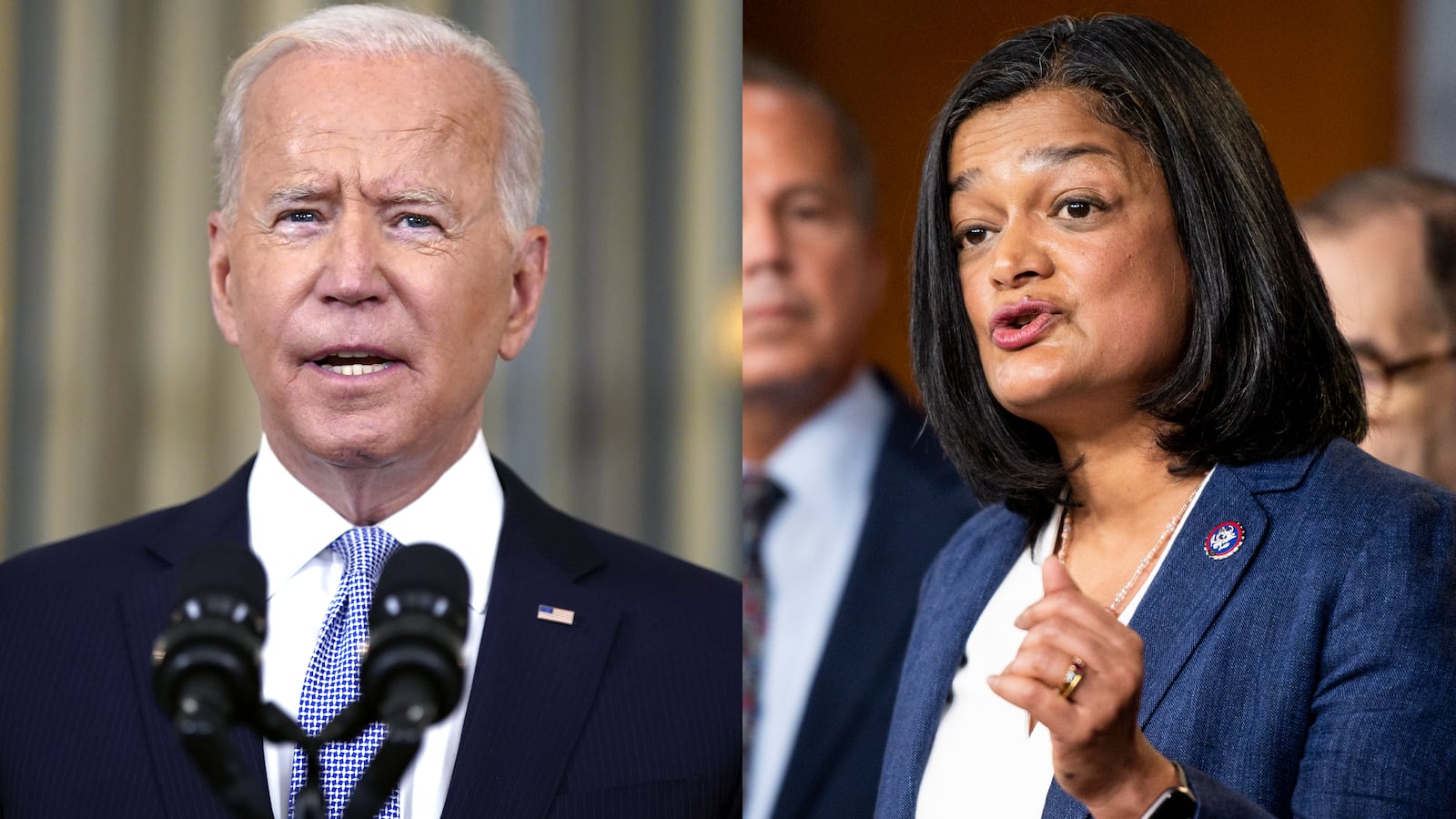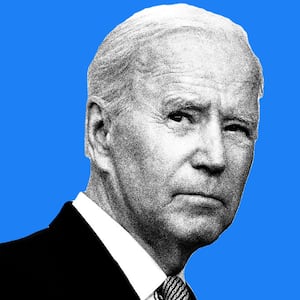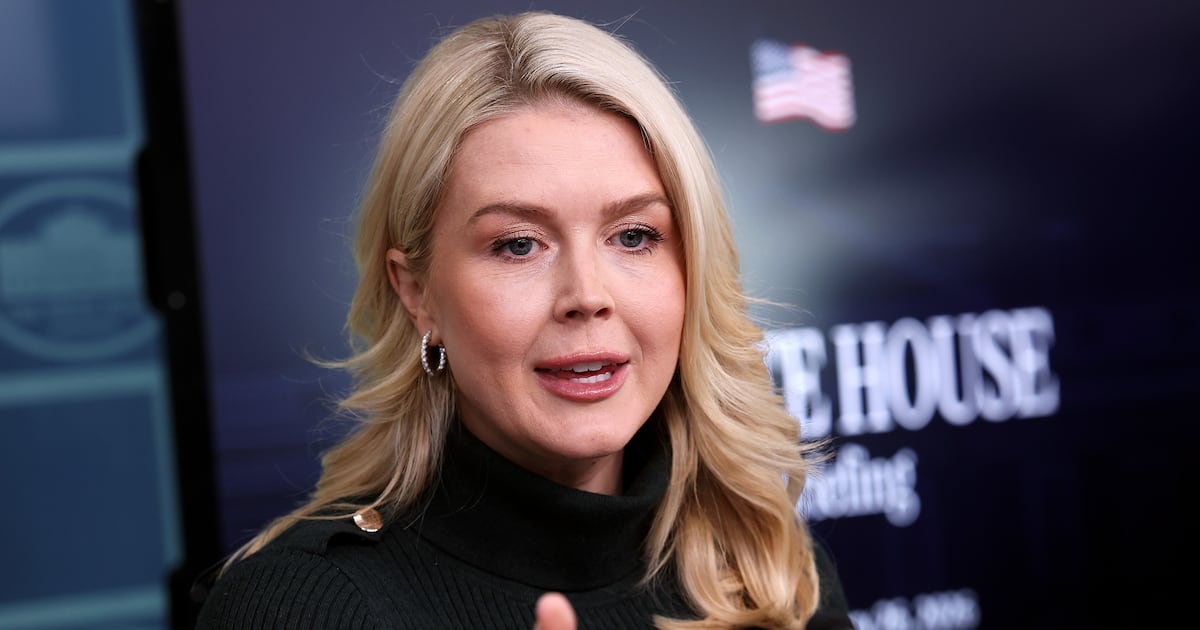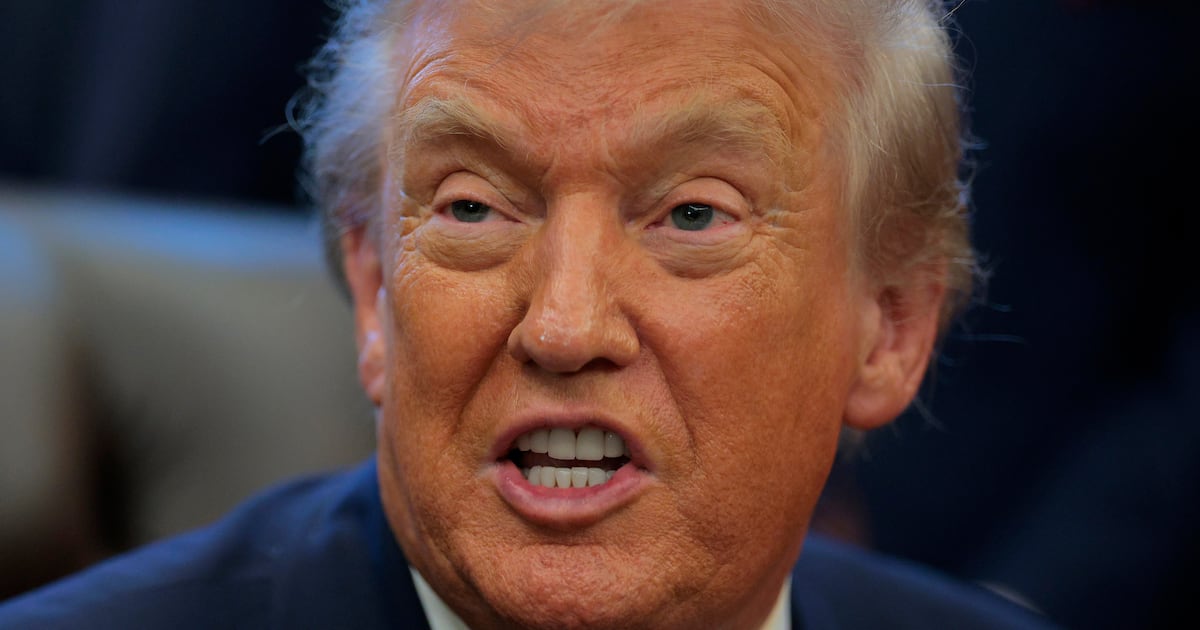When the top progressive in the U.S. House, Rep. Pramila Jayapal (D-WA), went on Rachel Maddow’s show last week, she used the massive platform to reiterate a threat: that her bloc of lawmakers would vote against a bipartisan infrastructure bill if it weren’t paired with a bill containing the health care, climate, and economic promises they’d ran on for years.
Indeed, Democratic leaders long promised that the $1 trillion bipartisan infrastructure bill would travel with a sweeping $3.5 trillion bill that would pass with only Democratic votes. But that vow faces a test this week: Democratic moderates forced a vote on the former bill before the latter is ready, and are essentially daring progressives to sink it.
That vote is scheduled for Thursday, according to a “Dear Colleague” letter sent by Speaker Nancy Pelosi Sunday night.
Bring it on, Jayapal said. “This is the leverage for transformational investments,” she told Maddow, “that people will wake up and feel differently about themselves and will know that government delivered for them.”
President Joe Biden, whose political fortunes ride on the passage of those two bills, was hardly taken aback by this rhetoric. In Jayapal’s telling, Biden loved it—so much so that he felt compelled to tell her so personally.
“He called me last night after I was on Maddow and congratulated me on doing a great job and said he was looking forward to talking to me, so I really want to hear what he has to say,” ” she told reporters.
The call, which came the night before a high-stakes White House meeting with progressives, distilled a strategy that has been a hallmark of Biden’s administration: conspicuous amounts of care, love, and attention for the party’s left flank.
That strategy has been in effect long before negotiations over Democrats’ marquee legislation reached a pivotal stage. “I've had more access in the first four months of this administration than I did in four years of the Obama administration,” Rep. Mark Pocan (D-WI), a former Congressional Progressive Caucus chair, told The Daily Beast.
Those open doors and frequent calls might be part of the reason that an establishment president is hearing the saber-rattling of his party’s most boisterous wing as music to his ears. Indeed, progressives have cast their ultimatums over the infrastructure bill not only as a principled stand for Democratic priorities, but as a show of loyalty to Biden and their shared agenda.
The claim is hardly a stretch. Progressives may not like the roads, bridges, and transit deal the president brokered with a group of centrist Democrats and Republicans, but they’ll accept it to secure passage of the broader Build Back Better Act, chock-full of investments that Biden himself frequently describes as vital.
Jayapal told The Daily Beast on Thursday that during her meeting with Biden on Wednesday, she told him that the outreach to progressives has been “really good.”
“His team has been really great,” Jayapal continued. “His vision, the President’s agenda and the Build Back Better plan, going back to the speech he gave in Congress, is what we’re trying to deliver to him. So it really feels like we’ve got his back and he wants both bills.”
This is not much different from what Speaker Nancy Pelosi (D-CA) has said about the legislation. But moderates’ anxiety to pass the bipartisan infrastructure deal—which they think is a clear win for the party that shouldn’t be left on the table—complicated her approach, when they used their leverage in the narrow House majority to push for a vote.
And some moderates would be happy to cut the scope of the Build Back Better Act down to a third of what Biden asked for. Rep. Kurt Schrader (D-OR) told The Daily Beast he’d have a hard time supporting legislation over $1 trillion.
The White House’s intentional relationship-building with the left was, perhaps, made for this intraparty standoff, and many Democrats feel the two sides are in lockstep at a key phase of the process. For a left flank accustomed to being tagged as the skunk at the proverbial picnic, it’s a somewhat unexpected development. “In the House, they assumed progressives would be the issue,” said one Democratic operative. “And now, the moderates are like, ‘where’s my lollipop?’”
While the kumbaya energy between the left and the Biden White House might be strong now, the road ahead might prove the greatest test of whatever goodwill they have built up—and prove, perhaps, other Democrats’ perceptions of progressives as uncooperative hardliners.
Some left-wing lawmakers, for instance, have laid down increasingly specific red lines around the legislation. Rep. Adriano Espaillat (D-NY), for example, issued a Friday statement saying he could not “fully support” a final deal that did not include significant immigration reforms. The Senate’s nonpartisan rules enforcer declared last week that such language was not procedurally in-bounds for this legislation—meaning any language passed in the House version would reach a dead end there.
Beyond that, many progressives remain frustrated over Biden’s decision to pursue bipartisanship on a narrower infrastructure deal, which they believe was unnecessary and complicated their broader agenda. “That really constrained us in our ability to carry out the president’s agenda,” said Rep. Jared Huffman (D-CA), a progressive member of the House Transportation and Infrastructure Committee.
Huffman said trust was not running out between progressives and Biden, but suggested time was running short. “Not yet,” he said. “I still think there’s a chance to land the plane.”
The fact that there is built-up trust at stake, however, is a relatively new development in the dynamic between left-wing legislators and Democratic presidents. As Pocan suggested, Barack Obama’s administration was famously aloof not just toward Congress as a whole, but progressives in particular.
During those years, progressives often felt that Obama and his team found time for them only when they needed their votes; in key instances, he did not convince them to deliver. In 2015, Obama was dealt a major embarrassment when House progressives blocked the advancement of the Trans-Pacific Partnership free trade pact, a second-term legacy item.
Some on the left were not convinced that Biden would be much different. He proudly campaigned in the 2020 primary as a mainstream counterweight to Sen. Bernie Sanders (I-VT) and rejected some of the policy stances the left pushed him hardest to embrace.
Those familiar with the White House’s approach to building relationships with the various wings of the party’s paper-thin House and Senate majorities say that the focus on outreach to the left feels a little bit like a hangover from the 2020 presidential primaries.
“When Joe won the nomination, the conversation immediately became ‘OK, but how does he bring Sanders voters into the fold?’ And the campaign took that seriously,” a former campaign adviser told The Daily Beast. “It wasn’t just in preparation for the general election—it was in preparation for a moment like this, when the entire agenda is on the line.”
The charm offensive began almost immediately after Biden clinched the nomination last spring, with the then-nominee and his team making calls to campaign surrogates and their staff in the early days of social isolation. Biden’s adoption of several components of the left’s platform—a $15 national minimum wage, student-loan forgiveness—has been carried over into the trillion-dollar “soft infrastructure” deal, with expansions of the social safety net, carbon emission reduction and higher taxes on the wealthiest Americans all thrown into the bill.
Progressives have been pleased from the get-go with how Biden has approached legislation. “We all know that on many of the top progressive priorities, he wasn’t a natural champion during the primaries,” said Huffman. “I’ve been very pleased to see him lean in and embrace many more progressive priorities than I think he traditionally might have.”
The biggest roadblocks to passing that enormous package by reconciliation—a straight majority vote in the U.S. Senate that can bypass the filibuster—have actually come from the more moderate flank of the Democratic Party that Biden has long represented.
The irony, another former campaign adviser said, has a bitter taste.
“The fun of being a Democrat is that in ensuring that one part of the caucus is being accommodated, policy-wise, you’re potentially alienating another part of the caucus,” they said in a text, concluding with an upside-down smiley face.
The White House may be trying to smooth over that zero-sum situation with conspicuous outreach to all corners of the party, not just progressives. Few lawmakers, for example, have gotten more direct attention than the two centrist swing votes in the Senate, Sens. Joe Manchin (D-WV) and Kyrsten Sinema (D-AZ). Sinema’s office claimed to the Wall Street Journal that she has had six total meetings with Biden about the legislation. The White House did not comment for this story.
Some of the most determined moderate holdouts say they’ve heard very little from the White House, however. Schrader, who has resisted the size, scope, and contents of the Build Back Better Act more than perhaps any other House Democrat, told The Daily Beast he was “disappointed” at the outreach from Biden’s team until now.
‘We're kind of late to the party, a little disappointed,” Schrader said. ‘They needed to be more vigorous earlier on, that hopefully it'll make up for here down the final stretch.”
In a show of equanimity, Biden spent his Wednesday afternoon last week chatting with Manchin, Sinema, and other moderates about their concerns before spending the evening hearing out progressives like Sanders and Jayapal.
But most Democrats felt that the meeting with centrists was perhaps more adversarial and high-stakes, given the clear differences between their attitudes on the legislation and the White House’s. Progressives, for their part, left 1600 Pennsylvania Avenue that day with the impression they’d just had a friendly huddle with their quarterback.
“I felt like we were in there in a celebratory strategy session more than anything else,” said Pocan, who attended the evening meeting with Biden. “That’s all we’re trying to do, is get the president’s agenda done, across the finish line.”
The week ahead is the most important one yet for Biden’s top legislative priority, and it will test his success so far in pleasing, or at least placating, progressives and moderates alike. With the House steaming ahead on a vote on the bipartisan infrastructure deal, Pelosi is vowing to advance the Build Back Better Act by week’s end.
Appearing on ABC’s This Week on Sunday, Pelosi downplayed divisions in her caucus, insisting that there is overwhelming agreement on the path forward. “This isn’t about moderates versus progressives,” Pelosi said. “Overwhelmingly, the entirety of our caucus, except for a few whose judgment I respect, support the vision of Joe Biden.”
But moderates and progressives remain far from agreement on almost every significant component of the package, from how much it will cost and how to pay for it, as well as on the details of key health care and climate provisions.
With so much still in flux, some progressives feel like they may inevitably get stiffed because, unlike moderates, all of them would prefer passing something instead of nothing, even if they were enthusiastic about the final product.
Indeed, many on the left have seen this particular movie before. But others are insisting this time is different—and they say that the flattery and care from the White House won’t shake their resolve.
“Progressives don’t feel like the attention from the White House is like, ‘We’ll just screw progressives in the end and they’ll eat the shit sandwich we give them,’” said a progressive strategist. “They’ve saved up their political capital for a moment like this.”









